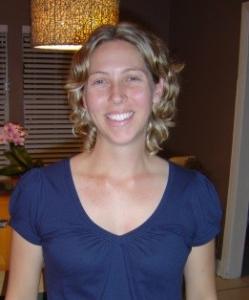Alison Moulding

Decades of Change in the Florida Reef Tract: An Oral History Project
Florida is home to the only barrier reef in the continental United States. This project uses oral history interviews of coral reef stakeholders in Florida to showcase major changes in the reef tract over the past few decades. The stakeholders interviewed include scientists, fishermen, and SCUBA (Self Contained Underwater Breathing Apparatus) divers.
Alison works in the NOAA Fisheries Southeast Regional Office in the Coral Conservation Branch of the Protected Resources Division. Her area of expertise is coral ecology, particularly reproduction, recruitment, and restoration. She provides scientific support for management actions and coordinates recovery-related activities for the seven species of Caribbean coral listed under the U.S. Endangered Species Act (ESA). Alison serves as the liaison between the Southeast Regional Office and the Acropora Recovery Implementation Team, a stakeholder group formed to implement the recovery plan for elkhorn and staghorn corals. She helps guide the team in prioritizing and implementing actions identified in the plan. She also participates in working groups of the Coral Restoration Consortium and is involved in developing guidance and products aimed at tracking and improving coral restoration success.
Scope and Content NoteAlison Moulding provides insights into coral restoration, conservation efforts, the complexities surrounding marine science and coral reefs, and her experiences as a woman in a male-dominated field. She also discusses her background and how she became interested in marine biology and coral research. Moulding explains the importance of coral reefs and the challenges they face due to climate change, pollution, and other factors. She talks about her work at length, specifically focusing on the Acropora species of coral and explains the techniques used in coral propagation and the challenges involved in scaling up restoration efforts. She discusses the success and limitations of coral restoration, emphasizing that while progress has been made, it's not a comprehensive solution to coral conservation. The interview briefly explores the cooperation between federal, state, and local agencies in coral conservation and restoration, going on to discuss her role as a liaison between the Acropora Recovery Implementation Team and NOAA’s Southeast Regional office, where she helps implement recovery plans and track conservation efforts. Moulding acknowledges that different organizations may have varying priorities but emphasizes that they ultimately work towards the same goal. The discussion shifts to the establishment of the Florida Keys National Marine Sanctuary in 1990 and the resistance it faced from some individuals and communities. Moulding reflects on the tensions that arise when restrictions are placed on activities in the name of conservation, but she also acknowledges the importance of conservation efforts.
Please Note: The oral histories in this collection are protected by copyright and have been created for educational, research and personal use as described by the Fair Use Doctrine in the U.S. Copyright law. Please reach out Voices@noaa.gov to let us know how these interviews are being used in your research, project, exhibit, etc. The Voices staff can help provide other useful resources related to your inquiry.
The NOAA mission is to understand and predict changes in climate, weather, oceans, and coasts, to share that knowledge and information with others, and to conserve and manage coastal and marine ecosystems and resources. The Voices Oral History Archives offers public access to a wide range of accounts, including historical materials that are products of their particular times, and may contain offensive language or negative stereotypes.
Voices Oral History Archives does not verify the accuracy of materials submitted to us. The opinions expressed in the interviews are those of the interviewee only. The interviews here have been made available to the public only after the interviewer has confirmed that they have obtained consent.
